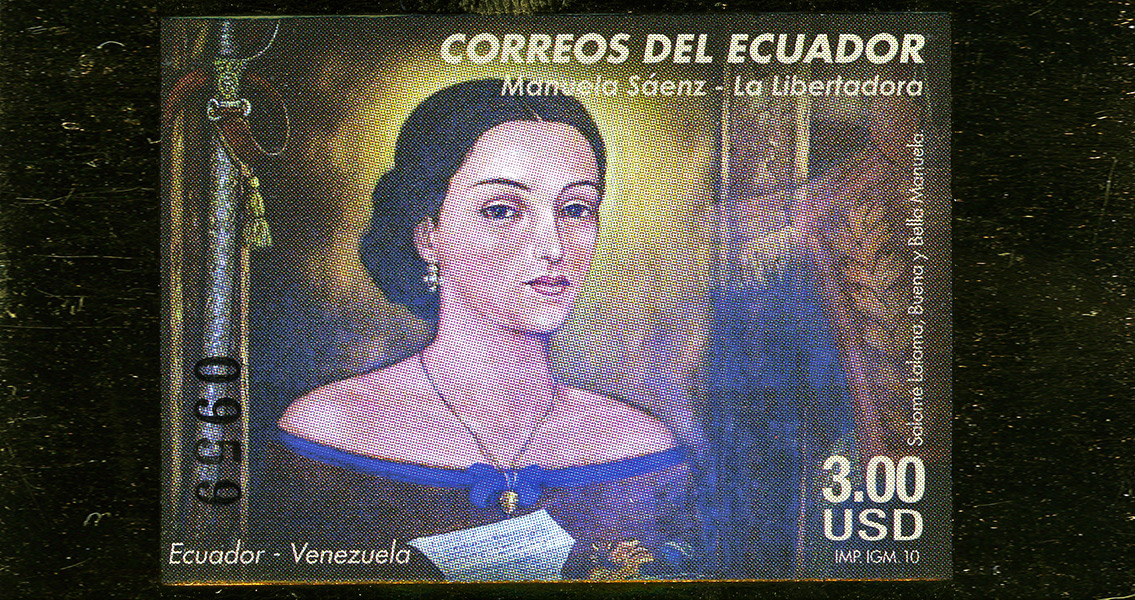<![CDATA[On 25th September, 1828, Simon Bolivar, the famed South American military tactician, resistance leader and ultimately dictator, narrowly escaped an assassination attempt. Simón José Antonio de la Santísima Trinidad Bolívar y Palacios, often referred to as El Libertador in Spanish, was saved by the quick thinking of his mistress, Manuela Saenz. As a group of Bolivar's enemies snuck into his home heavily armed, Saenz woke him up and told him to flee. Bolivar initially resisted his mistress' suggestion, preferring to fight despite being heavily outgunned and outnumbered, but eventually succumbed to her pleas and escaped out of a window. When the soldiers reached Bolivar's bedroom, Saenz was able to honestly tell them she had no idea where he was. El Libertador had successfully escaped the attempt on his life, and as a sign of his gratefulness, referred to Saenz as "Libertadora del Libertador" - Liberator of the Liberator. This was not the first time that Saenz had saved El Libertador's life. Six weeks earlier, Bolivar was attending a party which she had not been invited to when she received word that an attempt would be made on his life. At around 11:00pm she attempted to gain entry to the party by dressing in a military uniform, but was turned away by the guard. Refusing to give up, Saenz dressed up in dirty old clothes and stood outside making a commotion and screaming Bolivar's name. Becoming increasingly embarrassed by his mistress' behaviour, Bolivar left the party to reprimand her. When the assassins arrived, he was nowhere to be found. Although now highly revered in much of South America for his role in liberating a significant chunk of the continent from Spanish Imperialism, the assassination attempts in 1828 were a result of the controversies surrounding the formation of government in the newly emancipated territories. Born into a wealthy family connected to the gold mine industry in what is now Venezuela, Bolivar went to study in Spain following the death of his parents. He moved back to South America in 1807, and joined the resistance movement there following Napoleon's appointment of Joseph Bonaparte as King of Spain and its South American territories. In May 1813, Bolivar and his followers embarked upon a successful campaign to liberate Venezuela from the Spanish, proclaiming it the Second Republic of Venezuela. Civil war in the republic eventually forced Bolivar to flee to Jamaica, where he began his search for foreign support. With aid gained from Haiti, he returned to South America and embarked upon another military campaign against the Spanish, liberating much of what is now Venezuela, Colombia, Panama and Ecuador, and creating 'Gran Colombia' under his leadership. Following the defeat of the Spanish, Bolivar wanted Gran Colombia to become a free federation, similar to the United States to the north. Ultimately however, this brought him into conflict with various regional leaders who longed to break the republic headed by Bolivar and form independent nations. It is no coincidence that the attempts on his life came in August 1828, the same month that he declared himself the dictator of Gran Colombia. Bolivar died in 1830, but these earlier attempts on his life have become increasingly significant in recent years. In 2010, Dr. Paul Auwaerter from the John Hopkins Medical School carried out tests on Bolivar's exhumed body. Diagnosis' at the time of Bolivar's death concluded that he had died from tuberculosis, but Auwaerter's examination argued that El Libertador probably died from arsenic poisoning. Of course, there are countless explanations for arsenic entering Bolivar's system - doctors used it as a treatment in the nineteenth century, meaning it could have been administered to treat his tuberculosis, or he could have got it from intoxicated waters in what is now Peru, a place he spent much of his time. Nevertheless, many, including the late Venezuelan President Hugo Chavez, have taken Auwaerter's study as evidence that Bolivar was ultimately assassinated by a political rival.]]>
Mistress Saves Bolivar From Assassination
